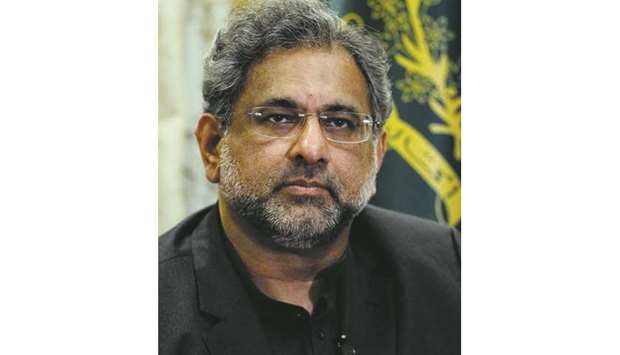Pakistan’s anti-corruption agency has arrested former prime minister Shahid Khaqan Abbasi, prompting opposition accusations that the government was trying to silence criticism.
He served as prime minister from August 2017 until May 2018.
His arrest comes just weeks after former president Asif Ali Zardari was arrested for graft.
The National Accountability Bureau (NAB) said in a statement that Abbasi had been detained in a case that was opened last year over a liquefied natural gas (LNG) terminal project.
The NAB had ordered an inquiry against Abbasi, former prime minister Nawaz Sharif and others “for granting a 15-year contract of LNG terminal to a company of their liking in violation of rules and by misuse of their powers, which caused (the) national exchequer a loss of billions of rupees”.
The NAB said yesterday that Abbasi failed to satisfy the agency during an investigation into the $15bn deal in 2016, when he was energy minister in Sharif’s cabinet.
The arrest, as Abbasi was on his way to a news conference in the eastern city of Lahore, further roiled a political scene already thick with accusations of corruption and abuse of office with opposition parties planning a day of protest next week.
“He has been arrested and is expected to be produced before a NAB court ... either today or tomorrow,” a senior NAB official told AFP on the condition of anonymity.
A second official from the bureau also confirmed the arrest.
Abbasi was travelling to Lahore to attend a news conference by Pakistan Muslim League – Nawaz (PML-N) president Shehbaz Sharif when he was arrested.
“The government has buried Pakistan’s economy and (is) now arresting our leaders to divert the masses’ attention from the real issues,” Shehbaz Sharif, who is the Opposition Leader in the National Assembly, told a press briefing in Lahore.
Shehbaz Sharif, the brother of Nawaz Sharif, is himself targeted by anti-corruption authorities.
“I believe today is yet another black day in Pakistan’s history,” Ahsan Iqbal, a senior PML-N parliamentarian, told reporters.
He accused Prime Minister Imran Khan of trying to suppress opposition.
“We are not afraid of your fascist acts. Don’t think that you will gag our voices through such arrests,” he said. Iqbal added that the name of the NAB should be changed to “PML-N Accountability Bureau”.
Former Sindh governor and PML-N leader Mohamed Zubair was critical of the arrest.
“They have no case against Shahid Khaqan Abbasi,” he said.
PML-N spokesperson Marriyum Aurangzeb spoke to media, claiming that a photocopy was hurriedly fetched by the NAB officials in order to justify the arrest.
She said that the former prime minister was arrested on an unattested warrant’s photocopy.
“This is the new Pakistan,” she continued.
“Another elected prime minister has been arrested. Will anyone else coming to power by vote also face the same lawlessness, humiliation, and injustice,” tweeted Nawaz Sharif’s daughter and PML-N vice-president Maryam Nawaz following the arrest.
Bilawal Bhutto Zardari, head of the Pakistan Peoples Party (PPP), the other main opposition force, condemned Abbasi’s arrest as what he called part of a government “witchhunt” against elected representatives.
Special Assistant to the Prime Minister Firdous Ashiq Awan said that everyone is equal in the eyes of law: “This is New Pakistan, here the institutions do not work upon whims but according to the law.”
The PML-N was already engaged in a bitter stand-off with Khan’s government, which came to power last year accusing Abbasi and his predecessor, Nawaz Sharif, of large-scale corruption and mismanagement of the economy.
In 2017 the Supreme Court disqualified Sharif from holding public office over accusations that eventually led to a seven-year jail sentence for receiving undeclared income.
Abbasi took over as premier and served for less than a year before losing an election to Khan’s Pakistan Tehreek-e-Insaf (PTI) party in 2018.
The PML-N accuses the government of being behind Nawaz Sharif’s arrest and last week produced video footage that it said showed the judge who heard the case confessing that he had been blackmailed to ensure a conviction.
The judge denied the accusation but was sacked from his position with the accountability court.
The government has rejected opposition accusations of using the NAB, an independent body, to suppress its critics and opponents.
It says corruption by past governments is the main reason for an economic crisis that has forced Pakistan to seek a $6bn loan package from the International Monetary Fund (IMF), its 13th IMF bailout since the 1980s.

Abbasi: failed to satisfy the NAB during an investigation into a $15bn deal in 2016 when he was energy minister.
